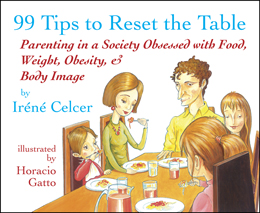Natalie is 16 years old, a straight-A student. She is looking into colleges and excited about leaving home. Six months ago, she began dieting: “I want to look good when I go to college and for the prom.” Natalie loses weight and at first, she seems happy. “I feel so grown up with my new clothes,” she beams!
One day, her boyfriend negatively comments on the looks of a girlfriend saying to Natalie, “ I hope you don’t gain the freshman 15.” Natalie freezes inside and reaffirms her efforts not to ever gain weight … by vowing to pursue dieting as it consumes her entire day.
17 Signs that Your Teen has an Eating Disorder
1) Your daughter no longer eats meat, carbohydrates or anything that contains fat.
2) Dieting is no longer one element of her life but an all-consuming activity.
3) Family eating becomes a battle. Your son refuses anything you serve.
4) Family events become impossible. No restaurant accommodates your teen’s needs.
5) Her weight comes off in front of your horrified eyes, no matter how much she reassures you that she is eating.
6) Your son isolates himself.
7) Friendships and social life become a thing of the past.
8) Grades go down.
9) Your daughter covers the body she worked so hard to make beautiful.
10) She becomes irritable and cold.
11) You see no joy on his life.
12) Exercising, purging or counting calories are the focus of the day.
15) Your teen uses a scale daily.
16) No matter what the number in the scale shows, he is unhappy.
17) She exercises unreasonably.
Tips for Parents
Eating disorders are very complex diseases. They are multi-factorial which means there may be genetic, biological, environmental and social forces at work. There may be familial forces at work too, but this is not always the case. In this instance, Natalie may be scared about leaving home and ambivalent about growing up. Genetically she may have always been the perfectionist type even if her parents never forced her to be driven.
The first thing to do, as a parent is not blame yourself! It is an important as you need to keep a clear mind to act appropriately, and not out of guilt! Once your son or your daughter crossed over from ‘just dieting’ into ‘problematic eating’ and finally into ‘an eating disorder’ you need to act quickly. Why? Because the eating disorder will consume her life and she will spend her days obsessing, counting calories, checking her weight, exercising or purging. The eating disorder sort of swallows up your son and engulfs the entire family.
It is very important that the family provides early treatment for the teen and seeks treatment for themselves if they need it. Studies show again and again that the sooner treatment is provided, the least the length of time the disease has gone on, the best prognosis the patient has.
What must you do?
1) Do not engage in fighting over amount of food eaten.
2) Do not try to convince your son to see things your way.
3) Let him know that, right or wrong, you are worried.
4) Explain that you have decided to seek an expert’s opinion.
5) Let her know that you will follow the expert’s opinion. And it may be, according to the expert’s opinion that she may need to see a doctor and a therapist. The professional will tell you how to handle things. (Your statement is not an invitation to discuss the issue.)
6) Research professionals to follow up with all treatment aspects.
Ultimately, trust your instincts. You will find the right help.
 Iréné Celcer, 56, has extensive experience working internationally with men, women, and children who suffer from obesity, body image disturbances and eating disorders. She is a regular guest at CNN where she talks about her specialties on , food and disordered eating, parenting and bullying. Iréné holds graduate degrees in psychology from Universidad de Belgrano, Argentina; Holistic Psychologyfrom Antioch University, San Francisco; and Social Work from Yeshiva University, New York. She is is the author of the collection of books, Hope & Will Have a Baby (Graphite Press, 2007, 2010), 99 Tips to Reset the Table: Parenting in a Society Obsessed with Food, Weight, Obesity, & Body Body Image (Graphite Press 2015). She is also the author of some books in Spanish: Mujer, Cuerpo, Dieta? La Voz de La Obsesion/ Women, Their Bodies & Dieting: The Voice of an Obsession/ (Vinciguerra 1996) and La Tirania de las Dietas/The Tyranny (Planeta 1994). Her daughter is 15 years old.
Iréné Celcer, 56, has extensive experience working internationally with men, women, and children who suffer from obesity, body image disturbances and eating disorders. She is a regular guest at CNN where she talks about her specialties on , food and disordered eating, parenting and bullying. Iréné holds graduate degrees in psychology from Universidad de Belgrano, Argentina; Holistic Psychologyfrom Antioch University, San Francisco; and Social Work from Yeshiva University, New York. She is is the author of the collection of books, Hope & Will Have a Baby (Graphite Press, 2007, 2010), 99 Tips to Reset the Table: Parenting in a Society Obsessed with Food, Weight, Obesity, & Body Body Image (Graphite Press 2015). She is also the author of some books in Spanish: Mujer, Cuerpo, Dieta? La Voz de La Obsesion/ Women, Their Bodies & Dieting: The Voice of an Obsession/ (Vinciguerra 1996) and La Tirania de las Dietas/The Tyranny (Planeta 1994). Her daughter is 15 years old.

